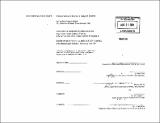Disturbing ecologies : interventions in Boston's seaport district
Author(s)
Gaspar, Christine
DownloadFull printable version (6.661Mb)
Other Contributors
Massachusetts Institute of Technology. Dept. of Urban Studies and Planning.
Advisor
J. Meejin Yoon and Gregory Morrow.
Terms of use
Metadata
Show full item recordAbstract
"For the past fifty years the question of nature has been conspicuously absent from urbanistic discourse... The development of the American city can be explained through the opposition between nature and culture, wilderness and city."-- Diana Agrest, 1996. From the Greek for study of the house, ecology refers to the relationships (or the study thereof) between organisms and their physical environment. As a field of study, ecology is relatively young, one that initially concentrated on descriptive research attempting to understand the processes of "natural" systems absent human intervention. Only recently have ecologists begun to argue for the understanding of the urban environment as participating in these processes. At issue in this debate is how one perceives the role of humans. The historical Western division between "nature" and "culture" is still operative; for many, the very definition of nature is that which is non-human. This thesis is an attempt to move beyond that division by forging an understanding of the city as a set of interlaced ecologies, including the biotic (animal, plants, microorganisms), the abiotic (water, wind, sun, soil), the sociocultural (social networks, psychogeography), the political (land uses, wards, school districts), and the economic (land value, capital flows), among others. Through an understanding that places humans and human settlement directly in nature, a new mode of urban intervention may becomes viable. The goal of this thesis is to explore and develop new models for understanding the ecological city, models that will enable new modes of urban intervention.
Description
Thesis (M. Arch.)--Massachusetts Institute of Technology, Dept. of Architecture; and, (M.C.P.)--Massachusetts Institute of Technology, Dept. of Urban Studies and Planning, 2004. Includes bibliographical references (p. 51-53).
Date issued
2004Department
Massachusetts Institute of Technology. Department of Architecture; Massachusetts Institute of Technology. Department of Urban Studies and PlanningPublisher
Massachusetts Institute of Technology
Keywords
Architecture., Urban Studies and Planning.